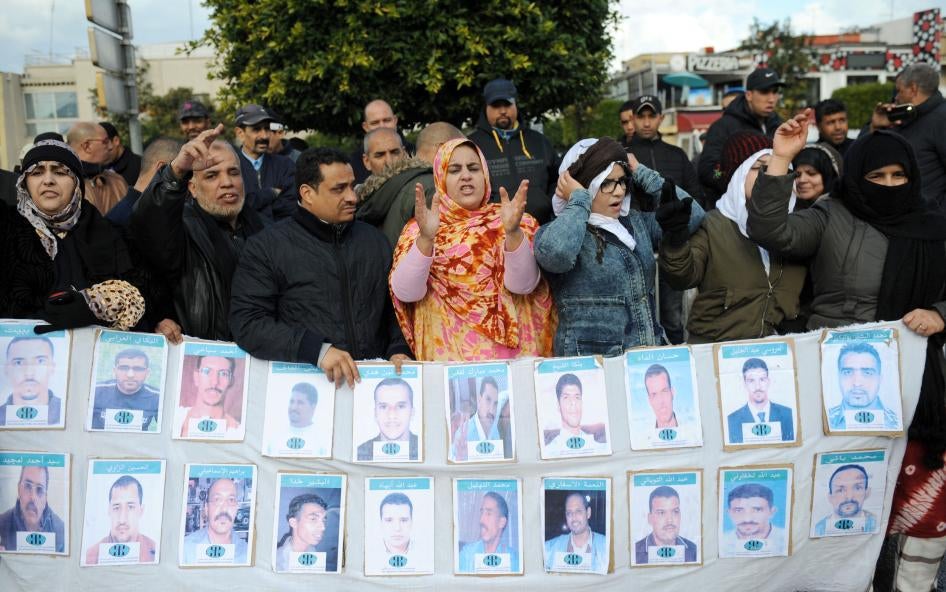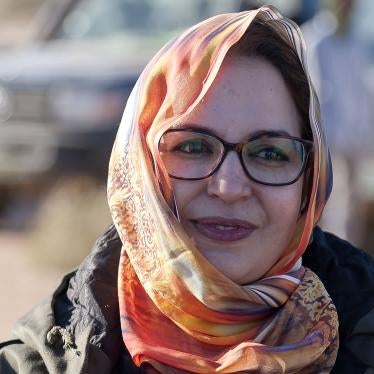(Tunis) – Nineteen Sahrawi activists languish in prison years after Moroccan courts convicted them in unfair proceedings, Human Rights Watch and Amnesty International said today.
The convictions of the so-called Gdeim Izik group stemmed from their purported role in lethal violence that erupted on November 8, 2010, when Moroccan police dismantled a protest encampment in Western Sahara. The trials were marred by a heavy reliance on “confessions” that the defendants repudiated as extracted through torture.
“Nineteen men have now spent 12 years in prison, with years still to serve, after trials that leaned heavily on tainted confessions,” said Lama Fakih, Middle East and North Africa director at Human Rights Watch. “The passage of time has only heightened the injustice in this case.”
The United Nations expert body on torture during the past year condemned violations of the Convention against Torture in three cases involving the Gdeim Izik defendants, and casts doubt on the probative value of the Moroccan judiciary’s tardy investigations into their torture allegations, which were unable to establish whether torture had taken place during the interrogations six years prior.
On November 8, 2010, Moroccan security forces moved to dismantle the Gdeim Izik encampment, which consisted of about 6,500 tents that Sahrawis had erected a month before near El-Ayoun, in Moroccan-controlled Western Sahara to protest their social and economic conditions. The resulting violent confrontations in the camp and in El-Ayoun killed 11 security officers, according to Moroccan officials, as well as 3 civilians.
Moroccan security forces repeatedly beat and abused people they detained in the immediate aftermath. Twenty-five men, some of whom the police detained before entering the camp, were later charged with forming a criminal gang and participating in or being complicit in violence against security forces “leading to death with intent,” among other charges. The men included several Sahrawi human rights defenders.
With the repudiated confessions serving as the main evidence, a military court in 2013 convicted all 25 defendants, sentencing 23 of them, including one in absentia who had fled abroad, to terms of 20 years or longer, and 2 to time already served.
In 2016, the Court of Cassation voided the military court verdict on the grounds that it was based on inconclusive evidence. The case was referred to a new trial in a civilian court.
In 2017, the Rabat Court of Appeals retried the case and upheld all of the convictions while reducing the sentences for two defendants, who were then freed. Another one of the original 25 had been on provisional release since 2011 for health reasons and died in 2018.
During the trial, the Appeals Court ordered forensic medical examinations of defendants willing to undergo them seven years after their interrogations. The examining doctors concluded in the cases they examined that, given the passage of time, torture could neither be proven nor disproven. The court nevertheless proceeded to admit the disputed confessions into evidence, alongside newly introduced evidence that largely failed to link individual defendants to specific acts of causing death or grievous injury.
In a November 2021, ruling on a complaint brought by one Gdeim Izik defendant, Mohamed Bourial, the UN Committee against Torture criticized the appeals court’s torture investigations, both for their tardiness and their failure to accord with the Istanbul Protocol, a set of guidelines for investigating and documenting torture allegations. The committee said that “the State party has far exceeded the reasonable length of time for dispensing justice in the complainant’s case…. 11 years after the events and the submission of the first allegations of torture, no investigation in accordance with the Istanbul Protocol has been carried out.”
The committee adopted a similar decision in July 2022 in response to a complaint by another Gdeim Izik prisoner, Abdeljalil Laaroussi, finding that:
the appeals court did not duly take into consideration the allegations of torture of [Laaroussi] when convicting him on the basis of his confessions. By not carrying out any verification of the substance of the petitioner’s allegations, apart from the medical examination ordered by the court, which had not been carried out in line with the Istanbul Protocol, and using those declarations in the judicial procedure against the petitioner, [Morocco] manifestly violated its obligations under article 15 of the convention [translation by Human Rights Watch].
Article 15 prohibits admitting evidence obtained through torture in any proceedings, except as evidence against someone accused of torture. The committee in 2022 also criticized Morocco in its ruling on a petition filed by a third Gdeim Izik complainant, Sidi Abdallah Abbahah. The main issue was again the failure to investigate promptly his torture allegations. The appeals court had offered in 2017 to investigate Abbahah’s allegations dating to 2010, but Abbahah refused.
Following the 2017 trial, the authorities dispersed the 19 remaining Gdeim Izik defendants, who had been held together, to 6 prisons inside Morocco. Most are being held in prisons at least 1,000 kilometers from El-Ayoun, the city most of them are from. Several have carried out repeated hunger strikes since then, alleging abuses including denial of medical care or family visits, and abusive solitary confinement. All have also demanded transfers to prisons closer to their families in or near Western Sahara. The UN Standard Minimum Rules for the Treatment of Prisoners states in article 59, “Prisoners shall be allocated, to the extent possible, to prisons close to their homes ….”
On October 31, Omar Hilale, Morocco’s ambassador to the United Nations, denied any mistreatment of the Gdeim Izik prisoners.
Morocco’s Court of Cassation upheld the verdict on November 25, 2020, leaving no avenues of domestic judicial appeal open.
On July 1, 2022, lawyers on behalf of 18 of the 19 prisoners filed a lengthy petition to the UN Working Group on Arbitrary Detention, asking it to declare their detention arbitrary. It has yet to issue a decision.
Most of Western Sahara, a non-self-governing territory according to the UN, has been under Morocco's de facto control since it seized the territory from Spain, its former colonial administrator, in 1975. The government considers it Moroccan territory and rejects demands for a vote on self-determination that would include independence as an option. That option was included in the referendum that Morocco and the Polisario, the liberation movement for Western Sahara, agreed to in a 1991 UN-brokered ceasefire agreement. The UN does not recognize Morocco’s de facto annexation.
Moroccan authorities systematically prevent gatherings in Western Sahara supporting Sahrawi self-determination. Morocco obstructs the work of some local human rights nongovernmental organizations, including by harassing their members and blocking legal registration processes, and on occasion beating activists and journalists in their custody and on the streets.
“The continued imprisonment of the Gdeim Izik group on the basis of tainted evidence shows that when it comes to those who oppose Moroccan rule over Western Sahara, a fair trial is a pipe dream,” said Amna Guellali, deputy Middle East and North Africa director at Amnesty International.
Gdeim Izik group prisoners:
|
Name |
Sentence |
Prison |
|
Abdallahi Elouali Lakhfaouni |
Life in prison |
Kenitra |
|
Ahmed Elbachir Sbai |
Life in prison |
Kenitra |
|
El Houssein Boujmaa Lmahjoub Zaoui |
25 years |
Kenitra |
|
Mohamed Elbachir Allali Boutanguiza |
Life in prison |
Kenitra |
|
Naama Abdi Asfari |
30 years |
Kenitra |
|
Hassan Sidi Raddi Eddah |
25 years |
Kenitra |
|
Abdeljalil Kamal Laaroussi |
Life in prison |
TanTan |
|
Elbachir Laabd Lmehdar Khadda |
20 years |
Tiflet |
|
Mohamed Lamine Abidine Haddi |
25 years |
Tiflet |
|
Sidi Abdellahi Ahmed Sidi Abbahah |
Life in prison |
Tiflet |
|
Mohamed Hassana Ahmed Salem Bourial |
30 years |
Ait Melloul |
|
Mohamed Mbarek Ali Salem Lefkir |
25 years |
TanTan |
|
Mohamed Ahnini Erouh Bani |
Life in prison |
Ait Melloul |
|
Sidi Ahmed Faraji Iich Lamjayed |
Life in prison |
Ait Melloul |
|
Brahim Daddi Ismaili |
Life in prison |
Ait Melloul |
|
Mohamed Ambito Andela Tahlil |
20 years |
Ain Bourja |
|
Abdoulah Ahmed Elhafed Toubali |
20 years |
Bouizakarn |
|
Chaikh Lkaouri Banga |
30 years |
Bouizakarn |
|
Mohamed Khouna Eddih Bobit |
25 years |
Bouizakarn |








